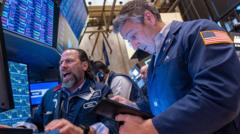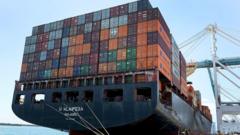Investors are left wondering how to interpret the recent market turmoil attributed to rising tariffs, which may spell trouble for both immediate finances and long-term economic health.
### Tariffs Spark Global Market Unrest: A Critical Examination

### Tariffs Spark Global Market Unrest: A Critical Examination
As tariffs fuel anxiety in financial markets, experts weigh the potential repercussions for investors and economies.
In a tumultuous turn of events, global stock markets have taken a nosedive following the announcement of stringent tariffs imposed by the United States. This development has spurred discussions about whether the current situation qualifies as a 'stock market crash,' and how this impacts individual investors.
Historically, the term "crash" is reserved for drastic drops in market value—typically over 20%—within a short time frame. For instance, Black Monday on October 19, 1987, saw the US stock market plummet by 23% in just one day, while the infamous Wall Street Crash of 1929 saw a staggering 50% drop in a matter of weeks. In contrast, the current downturn has seen the US market decrease by approximately 17% since its peak in February and show a modest 2% dip from the previous year’s figures. The UK’s FTSE index has also experienced significant declines, albeit lagging slightly behind due to time zone differences.
These rapid fluctuations echo the early panic witnessed during the Covid-19 outbreak in 2020, raising concerns that we are teetering on the edge of a bear market—a term used to describe a market more prone to decline than to recovery.
For the average person, the effects of this market decline primarily ripple through pension plans, either defined benefit schemes that promise a fixed income or defined contribution plans that fluctuate with market performance. While defined contribution schemes seem vulnerable, a substantial portion of pension contributions invests in safer options like government bonds, which often gain value during stock market drops, providing a buffer against losses.
For individuals nearing retirement, a greater allocation toward bonds typically reduces exposure to stock market volatility. Although these sharp declines can sound alarming, it's crucial to note that long-term stock investments have historically recovered and proven rewarding over time.
At the core of the chaos lies the fundamental concern regarding the health of the broad economy. The stock market acts as an indicator of future company profitability; thus, a downturn signals widespread pessimism about business prospects. Analysts predict that President Trump’s tariff strategy could lead to increased consumer prices, reduced demand, and declining profits—creating a challenging landscape for corporations that could ultimately trigger job cuts and stifle investments.
While the immediate concern may focus on pension valuations, the overarching implications of these market shifts present a more serious narrative, hinting at potential economic downturns that could impact various sectors for years to come. Thus, while the current situation demands attention, careful analysis of its long-term consequences is vital for navigating the uncertain economic terrain ahead.
As markets respond to retaliatory measures from China and the broader implications of US tariffs, stakeholders must remain vigilant in understanding both the immediate and enduring effects on the economy and personal finances.
Historically, the term "crash" is reserved for drastic drops in market value—typically over 20%—within a short time frame. For instance, Black Monday on October 19, 1987, saw the US stock market plummet by 23% in just one day, while the infamous Wall Street Crash of 1929 saw a staggering 50% drop in a matter of weeks. In contrast, the current downturn has seen the US market decrease by approximately 17% since its peak in February and show a modest 2% dip from the previous year’s figures. The UK’s FTSE index has also experienced significant declines, albeit lagging slightly behind due to time zone differences.
These rapid fluctuations echo the early panic witnessed during the Covid-19 outbreak in 2020, raising concerns that we are teetering on the edge of a bear market—a term used to describe a market more prone to decline than to recovery.
For the average person, the effects of this market decline primarily ripple through pension plans, either defined benefit schemes that promise a fixed income or defined contribution plans that fluctuate with market performance. While defined contribution schemes seem vulnerable, a substantial portion of pension contributions invests in safer options like government bonds, which often gain value during stock market drops, providing a buffer against losses.
For individuals nearing retirement, a greater allocation toward bonds typically reduces exposure to stock market volatility. Although these sharp declines can sound alarming, it's crucial to note that long-term stock investments have historically recovered and proven rewarding over time.
At the core of the chaos lies the fundamental concern regarding the health of the broad economy. The stock market acts as an indicator of future company profitability; thus, a downturn signals widespread pessimism about business prospects. Analysts predict that President Trump’s tariff strategy could lead to increased consumer prices, reduced demand, and declining profits—creating a challenging landscape for corporations that could ultimately trigger job cuts and stifle investments.
While the immediate concern may focus on pension valuations, the overarching implications of these market shifts present a more serious narrative, hinting at potential economic downturns that could impact various sectors for years to come. Thus, while the current situation demands attention, careful analysis of its long-term consequences is vital for navigating the uncertain economic terrain ahead.
As markets respond to retaliatory measures from China and the broader implications of US tariffs, stakeholders must remain vigilant in understanding both the immediate and enduring effects on the economy and personal finances.






















